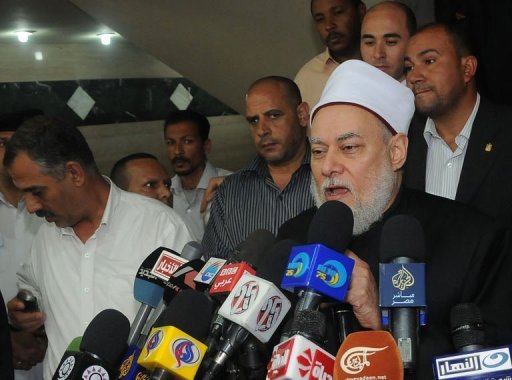
Egypt’s Islamist-dominated parliament yesterday called on the Mufti to quit after a visit to Jerusalem, stepping up pressure on the state-appointed official over a trip that critics say bestowed recognition of Israeli control of the city.
Mufti Ali Gomaa’s trip to East Jerusalem, captured by Israel in the 1967 Middle East war, has caused a stir in Egypt and across the Arab region, where he has been criticised for a visit that has revived debate about normalisation with Israel.
Gomaa has defended himself, saying his trip was in a personal rather than official capacity and a response to an invitation from Jordan, which lost the city to Israel in 1967 but remains the custodian of its Muslim holy sites. He prayed at the Al Aqsa mosque, the third holiest site in Islam.
Though Egypt made peace with Israel in 1979, most Egyptians are largely opposed to any normalisation between the two countries until they see that Palestinian rights are restored.
The Muslim Brotherhood, an Islamist group and the largest party in the Egyptian parliament, has called Gomaa’s visit “a catastrophe”.
In protest at the visit, the Egyptian Writers’ Union also moved to terminate Gomaa’s membership.
“The brutal enemy controls (Jerusalem’s) entries, exits, mosques, and churches,” the parliamentary committee responsible for religious affairs said in a statement, recommending the vote that called on Gomaa to step down.
“Going into (Jerusalem) enforces occupation and bestows upon it legitimacy, as it also represents a sign of normalisation with the Zionist entity that is popularly rejected.”
Parliament voted to ask Gomaa to apologise to the Arab and Islamic people and submit his resignation. The gesture cannot force him from office but carries symbolic weight and is another example of Egypt’s newly-elected MPs seeking to punch above the weight accorded them by Egypt’s interim system of government.
The country is currently governed by a council of military generals who took power from deposed president Hosni Mubarak. The Mufti’s main job is to issue Islamic legal opinions.
Ibrahim Negm, a senior adviser to the Mufti, said Gomaa had not been formally notified of parliament’s vote and doubted he would step down because the visit was “not a crime”.
Earlier, Gomaa defended his trip on his Twitter account. “Jerusalem is in the heart of every Muslim,” he said. “Visiting Jerusalem increases one’s feelings of rejection of occupation and injustice and helps strengthen the (Palestinian) cause.”
Palestinians want East Jerusalem as a future capital of a Palestinian state, although peace talks towards the establishment of that state are at a standstill. Israel describes Jerusalem as its eternal undivided capital.
While Gomaa’s visit has drawn a wave of criticism in Egypt, the Palestinian Authority has welcomed it as a gesture of solidarity. Mahmoud al-Habash, the Palestinian minister responsible for religious endowments, said yesterday the criticism had no religious or political justification.
He expected other Islamic figures to visit the city soon.
But the Hamas movement, which governs the Gaza Strip, criticised Gomaa’s trip as an act of normalisation.



